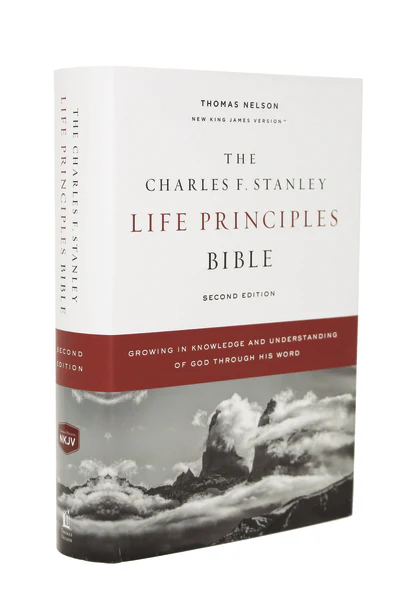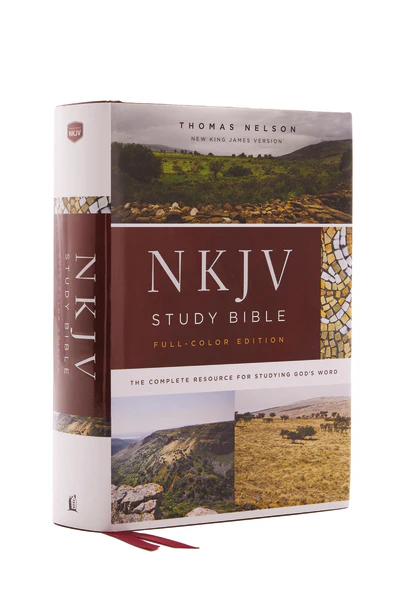Nehemiah 13
New King James Version
Principles of Separation(A)
13 On that day (B)they read from the Book of Moses in the hearing of the people, and in it was found written (C)that no Ammonite or Moabite should ever come into the assembly of God, 2 because they had not met the children of Israel with bread and water, but (D)hired Balaam against them to curse them. (E)However, our God turned the curse into a blessing. 3 So it was, when they had heard the Law, (F)that they separated all the mixed multitude from Israel.
The Reforms of Nehemiah
4 Now before this, (G)Eliashib the priest, having authority over the storerooms of the house of our God, was allied with (H)Tobiah. 5 And he had prepared for him a large room, (I)where previously they had stored the grain offerings, the frankincense, the articles, the tithes of grain, the new wine and oil, (J)which were commanded to be given to the Levites and singers and gatekeepers, and the offerings for the priests. 6 But during all this I was not in Jerusalem, (K)for in the thirty-second year of Artaxerxes king of Babylon I had returned to the king. Then after certain days I obtained leave from the king, 7 and I came to Jerusalem and discovered the evil that Eliashib had done for Tobiah, in (L)preparing a room for him in the courts of the [a]house of God. 8 And it grieved me bitterly; therefore I threw all the household goods of Tobiah out of the room. 9 Then I commanded them to (M)cleanse the rooms; and I brought back into them the articles of the house of God, with the grain offering and the frankincense.
10 I also realized that the portions for the Levites had (N)not been given them; for each of the Levites and the singers who did the work had gone back to (O)his field. 11 So (P)I contended with the rulers, and said, (Q)“Why is the house of God forsaken?” And I gathered them together and set them in their place. 12 (R)Then all Judah brought the tithe of the grain and the new wine and the oil to the storehouse. 13 (S)And I appointed as treasurers over the storehouse Shelemiah the priest and Zadok the scribe, and of the Levites, Pedaiah; and next to them was Hanan the son of Zaccur, the son of Mattaniah; for they were considered (T)faithful, and their task was to distribute to their brethren.
14 (U)Remember me, O my God, concerning this, and do not wipe out my good deeds that I have done for the house of my God, and for its services!
15 In those days I saw people in Judah treading winepresses (V)on the Sabbath, and bringing in sheaves, and loading donkeys with wine, grapes, figs, and all kinds of burdens, (W)which they brought into Jerusalem on the Sabbath day. And I warned them about the day on which they were selling provisions. 16 Men of Tyre dwelt there also, who brought in fish and all kinds of goods, and sold them on the Sabbath to the children of Judah, and in Jerusalem.
17 Then I contended with the nobles of Judah, and said to them, “What evil thing is this that you do, by which you profane the Sabbath day? 18 (X)Did not your fathers do thus, and did not our God bring all this disaster on us and on this city? Yet you bring added wrath on Israel by profaning the Sabbath.”
19 So it was, at the gates of Jerusalem, as it (Y)began to be dark before the Sabbath, that I commanded the gates to be shut, and charged that they must not be opened till after the Sabbath. (Z)Then I posted some of my servants at the gates, so that no burdens would be brought in on the Sabbath day. 20 Now the merchants and sellers of all kinds of [b]wares [c]lodged outside Jerusalem once or twice.
21 Then I warned them, and said to them, “Why do you spend the night [d]around the wall? If you do so again, I will lay hands on you!” From that time on they came no more on the Sabbath. 22 And I commanded the Levites that (AA)they should cleanse themselves, and that they should go and guard the gates, to sanctify the Sabbath day.
Remember me, O my God, concerning this also, and spare me according to the greatness of Your mercy!
23 In those days I also saw Jews who (AB)had married women of (AC)Ashdod, Ammon, and Moab. 24 And half of their children spoke the language of Ashdod, and could not speak the language of Judah, but spoke according to the language of one or the other people.
25 So I (AD)contended with them and [e]cursed them, struck some of them and pulled out their hair, and made them (AE)swear by God, saying, “You shall not give your daughters as wives to their sons, nor take their daughters for your sons or yourselves. 26 (AF)Did not Solomon king of Israel sin by these things? Yet among many nations there was no king like him, (AG)who was beloved of his God; and God made him king over all Israel. (AH)Nevertheless pagan women caused even him to sin. 27 Should we then hear of your doing all this great evil, (AI)transgressing against our God by marrying pagan women?”
28 And one of the sons (AJ)of Joiada, the son of Eliashib the high priest, was a son-in-law of (AK)Sanballat the Horonite; therefore I drove him from me.
29 (AL)Remember them, O my God, because they have defiled the priesthood and (AM)the covenant of the priesthood and the Levites.
30 (AN)Thus I cleansed them of everything pagan. I also (AO)assigned duties to the priests and the Levites, each to his service, 31 and to bringing (AP)the wood offering and the firstfruits at appointed times.
(AQ)Remember me, O my God, for good!
Footnotes
- Nehemiah 13:7 Temple
- Nehemiah 13:20 merchandise
- Nehemiah 13:20 spent the night
- Nehemiah 13:21 Lit. before
- Nehemiah 13:25 pronounced them cursed
Esther 1-4
New King James Version
The King Dethrones Queen Vashti
1 Now it came to pass in the days of (A)Ahasuerus[a] (this was the Ahasuerus who reigned (B)over one hundred and twenty-seven provinces, (C)from India to Ethiopia), 2 in those days when King Ahasuerus (D)sat on the throne of his kingdom, which was in (E)Shushan[b] the [c]citadel, 3 that in the third year of his reign he (F)made a feast for all his officials and servants—the powers of Persia and Media, the nobles, and the princes of the provinces being before him— 4 when he showed the riches of his glorious kingdom and the splendor of his excellent majesty for many days, one hundred and eighty days in all.
5 And when these days were completed, the king made a feast lasting seven days for all the people who were present in [d]Shushan the [e]citadel, from great to small, in the court of the garden of the king’s palace. 6 There were white and blue linen curtains fastened with cords of fine linen and purple on silver rods and marble pillars; and the (G)couches were of gold and silver on a mosaic pavement of alabaster, turquoise, and white and black marble. 7 And they served drinks in golden vessels, each vessel being different from the other, with royal wine in abundance, (H)according to the [f]generosity of the king. 8 In accordance with the law, the drinking was not compulsory; for so the king had ordered all the officers of his household, that they should do according to each man’s pleasure.
9 Queen Vashti also made a feast for the women in the royal palace which belonged to King Ahasuerus.
10 On the seventh day, when the heart of the king was merry with wine, he commanded Mehuman, Biztha, (I)Harbona, Bigtha, Abagtha, Zethar, and Carcas, seven eunuchs who served in the presence of King Ahasuerus, 11 to bring Queen Vashti before the king, wearing her royal crown, in order to show her beauty to the people and the officials, for she was beautiful to behold. 12 But Queen Vashti refused to come at the king’s command brought by his eunuchs; therefore the king was furious, and his anger burned within him.
13 Then the king said to the (J)wise men (K)who understood the times (for this was the king’s manner toward all who knew law and justice, 14 those closest to him being Carshena, Shethar, Admatha, Tarshish, Meres, Marsena, and Memucan, the (L)seven princes of Persia and Media, (M)who had access to the king’s presence, and who [g]ranked highest in the kingdom): 15 “What shall we do to Queen Vashti, according to law, because she did not obey the command of King Ahasuerus brought to her by the eunuchs?”
16 And Memucan answered before the king and the princes: “Queen Vashti has not only wronged the king, but also all the princes, and all the people who are in all the provinces of King Ahasuerus. 17 For the queen’s behavior will become known to all women, so that they will (N)despise their husbands in their eyes, when they report, ‘King Ahasuerus commanded Queen Vashti to be brought in before him, but she did not come.’ 18 This very day the noble ladies of Persia and Media will say to all the king’s officials that they have heard of the behavior of the queen. Thus there will be excessive contempt and wrath. 19 If it pleases the king, let a royal [h]decree go out from him, and let it be recorded in the laws of the Persians and the Medes, so that it will (O)not [i]be altered, that Vashti shall come no more before King Ahasuerus; and let the king give her royal position to another who is better than she. 20 When the king’s decree which he will make is proclaimed throughout all his empire (for it is great), all wives will (P)honor their husbands, both great and small.”
21 And the reply pleased the king and the princes, and the king did according to the word of Memucan. 22 Then he sent letters to all the king’s provinces, (Q)to each province in its own script, and to every people in their own language, that each man should (R)be master in his own house, and speak in the language of his own people.
Esther Becomes Queen
2 After these things, when the wrath of King Ahasuerus subsided, he remembered Vashti, (S)what she had done, and what had been decreed against her. 2 Then the king’s servants who attended him said: “Let beautiful young virgins be sought for the king; 3 and let the king appoint officers in all the provinces of his kingdom, that they may gather all the beautiful young virgins to [j]Shushan the [k]citadel, into the women’s quarters, under the custody of [l]Hegai the king’s eunuch, custodian of the women. And let beauty preparations be given them. 4 Then let the young woman who pleases the king be queen instead of Vashti.”
This thing pleased the king, and he did so.
5 In [m]Shushan the [n]citadel there was a certain Jew whose name was Mordecai the son of Jair, the son of Shimei, the son of (T)Kish, a Benjamite. 6 (U)Kish[o] had been carried away from Jerusalem with the captives who had been captured with [p]Jeconiah king of Judah, whom Nebuchadnezzar the king of Babylon had carried away. 7 And Mordecai had brought up Hadassah, that is, Esther, (V)his uncle’s daughter, for she had neither father nor mother. The young woman was lovely and beautiful. When her father and mother died, Mordecai took her as his own daughter.
8 So it was, when the king’s command and decree were heard, and when many young women were (W)gathered at [q]Shushan the [r]citadel, under the custody of Hegai, that Esther also was taken to the king’s palace, into the care of Hegai the custodian of the women. 9 Now the young woman pleased him, and she obtained his favor; so he readily gave (X)beauty preparations to her, besides [s]her allowance. Then seven choice maidservants were provided for her from the king’s palace, and he moved her and her maidservants to the best place in the house of the women.
10 (Y)Esther had not [t]revealed her people or family, for Mordecai had charged her not to reveal it. 11 And every day Mordecai paced in front of the court of the women’s quarters, to learn of Esther’s welfare and what was happening to her.
12 Each young woman’s turn came to go in to King Ahasuerus after she had completed twelve months’ preparation, according to the regulations for the women, for thus were the days of their preparation apportioned: six months with oil of myrrh, and six months with perfumes and preparations for beautifying women. 13 Thus prepared, each young woman went to the king, and she was given whatever she desired to take with her from the women’s quarters to the king’s palace. 14 In the evening she went, and in the morning she returned to the second house of the women, to the custody of Shaashgaz, the king’s eunuch who kept the concubines. She would not go in to the king again unless the king delighted in her and called for her by name.
15 Now when the turn came for Esther (Z)the daughter of Abihail the uncle of Mordecai, who had taken her as his daughter, to go in to the king, she requested nothing but what Hegai the king’s eunuch, the custodian of the women, advised. And Esther (AA)obtained favor in the sight of all who saw her. 16 So Esther was taken to King Ahasuerus, into his royal palace, in the tenth month, which is the month of Tebeth, in the seventh year of his reign. 17 The king loved Esther more than all the other women, and she obtained grace and favor in his sight more than all the virgins; so he set the royal (AB)crown upon her head and made her queen instead of Vashti. 18 Then the king (AC)made a great feast, the Feast of Esther, for all his officials and servants; and he proclaimed a holiday in the provinces and gave gifts according to the [u]generosity of a king.
Mordecai Discovers a Plot
19 When virgins were gathered together a second time, Mordecai sat within the king’s gate. 20 (AD)Now Esther had not revealed her family and her people, just as Mordecai had charged her, for Esther obeyed the command of Mordecai as when she was brought up by him.
21 In those days, while Mordecai sat within the king’s gate, two of the king’s eunuchs, [v]Bigthan and Teresh, doorkeepers, became furious and sought to lay hands on King Ahasuerus. 22 So the matter became known to Mordecai, (AE)who told Queen Esther, and Esther informed the king in Mordecai’s name. 23 And when an inquiry was made into the matter, it was confirmed, and both were hanged on a gallows; and it was written in (AF)the book of the chronicles in the presence of the king.
Haman’s Conspiracy Against the Jews
3 After these things King Ahasuerus promoted Haman, the son of Hammedatha the (AG)Agagite, and (AH)advanced him and set his seat above all the princes who were with him. 2 And all the king’s servants who were (AI)within the king’s gate bowed and paid homage to Haman, for so the king had commanded concerning him. But Mordecai (AJ)would not bow or pay homage. 3 Then the king’s servants who were within the king’s gate said to Mordecai, “Why do you transgress the (AK)king’s command?” 4 Now it happened, when they spoke to him daily and he would not listen to them, that they told it to Haman, to see whether Mordecai’s words would stand; for Mordecai had told them that he was a Jew. 5 When Haman saw that Mordecai (AL)did not bow or pay him homage, Haman was (AM)filled with wrath. 6 But he disdained to lay hands on Mordecai alone, for they had told him of the people of Mordecai. Instead, Haman (AN)sought to destroy all the Jews who were throughout the whole kingdom of Ahasuerus—the people of Mordecai.
7 In the first month, which is the month of Nisan, in the twelfth year of King Ahasuerus, (AO)they cast Pur (that is, the lot), before Haman [w]to determine the day and the [x]month, [y]until it fell on the twelfth month, which is the month of Adar.
8 Then Haman said to King Ahasuerus, “There is a certain people scattered and dispersed among the people in all the provinces of your kingdom; (AP)their laws are different from all other people’s, and they do not keep the king’s laws. Therefore it is not fitting for the king to let them remain. 9 If it pleases the king, let a decree be written that they be destroyed, and I will pay ten thousand talents of silver into the hands of those who do the work, to bring it into the king’s treasuries.”
10 So the king (AQ)took (AR)his signet ring from his hand and gave it to Haman, the son of Hammedatha the Agagite, the (AS)enemy of the Jews. 11 And the king said to Haman, “The money and the people are given to you, to do with them as seems good to you.”
12 (AT)Then the king’s scribes were called on the thirteenth day of the first month, and a decree was written according to all that Haman commanded—to the king’s satraps, to the governors who were over each province, to the officials of all people, to every province (AU)according to its script, and to every people in their language. (AV)In the name of King Ahasuerus it was written, and sealed with the king’s signet ring. 13 And the letters were (AW)sent by couriers into all the king’s provinces, to destroy, to kill, and to annihilate all the Jews, both young and old, little children and women, (AX)in one day, on the thirteenth day of the twelfth month, which is the month of Adar, and (AY)to plunder their [z]possessions. 14 (AZ)A copy of the document was to be issued as law in every province, being published for all people, that they should be ready for that day. 15 The couriers went out, hastened by the king’s command; and the decree was proclaimed in [aa]Shushan the [ab]citadel. So the king and Haman sat down to drink, but (BA)the city of Shushan was [ac]perplexed.
Esther Agrees to Help the Jews
4 When Mordecai learned all that had happened, [ad]he (BB)tore his clothes and put on sackcloth (BC)and ashes, and went out into the midst of the city. He (BD)cried out with a loud and bitter cry. 2 He went as far as the front of the king’s gate, for no one might enter the king’s gate clothed with sackcloth. 3 And in every province where the king’s command and decree arrived, there was great mourning among the Jews, with fasting, weeping, and wailing; and many lay in sackcloth and ashes.
4 So Esther’s maids and eunuchs came and told her, and the queen was deeply distressed. Then she sent garments to clothe Mordecai and take his sackcloth away from him, but he would not accept them. 5 Then Esther called Hathach, one of the king’s eunuchs whom he had appointed to attend her, and she gave him a command concerning Mordecai, to learn what and why this was. 6 So Hathach went out to Mordecai in the city square that was in front of the king’s gate. 7 And Mordecai told him all that had happened to him, and (BE)the sum of money that Haman had promised to pay into the king’s treasuries to destroy the Jews. 8 He also gave him (BF)a copy of the written decree for their destruction, which was given at [ae]Shushan, that he might show it to Esther and explain it to her, and that he might command her to go in to the king to make supplication to him and plead before him for her people. 9 So Hathach returned and told Esther the words of Mordecai.
10 Then Esther spoke to Hathach, and gave him a command for Mordecai: 11 “All the king’s servants and the people of the king’s provinces know that any man or woman who goes into (BG)the inner court to the king, who has not been called, (BH)he has but one law: put all to death, except the one (BI)to whom the king holds out the golden scepter, that he may live. Yet I myself have not been (BJ)called to go in to the king these thirty days.” 12 So they told Mordecai Esther’s words.
13 And Mordecai told them to answer Esther: “Do not think in your heart that you will escape in the king’s palace any more than all the other Jews. 14 For if you remain completely silent at this time, relief and deliverance will arise for the Jews from another place, but you and your father’s house will perish. Yet who knows whether you have come to the kingdom for such a time as this?”
15 Then Esther told them to reply to Mordecai: 16 “Go, gather all the Jews who are present in [af]Shushan, and fast for me; neither eat nor drink for (BK)three days, night or day. My maids and I will fast likewise. And so I will go to the king, which is against the law; (BL)and if I perish, I perish!”
17 So Mordecai went his way and did according to all that Esther commanded [ag]him.
Footnotes
- Esther 1:1 Generally identified with Xerxes I (485–464 b.c.)
- Esther 1:2 Or Susa
- Esther 1:2 Or fortified palace, and so elsewhere in the book
- Esther 1:5 Or Susa
- Esther 1:5 palace
- Esther 1:7 Lit. hand
- Esther 1:14 Lit. sat in first place
- Esther 1:19 Lit. word
- Esther 1:19 pass away
- Esther 2:3 Or Susa
- Esther 2:3 palace
- Esther 2:3 Heb. Hege
- Esther 2:5 Or Susa
- Esther 2:5 palace
- Esther 2:6 Lit. Who
- Esther 2:6 Jehoiachin, 2 Kin. 24:6
- Esther 2:8 Or Susa
- Esther 2:8 palace
- Esther 2:9 Lit. her portions
- Esther 2:10 Revealed the identity of
- Esther 2:18 Lit. hand
- Esther 2:21 Bigthana, Esth. 6:2
- Esther 3:7 Lit. from day to day and month to month
- Esther 3:7 LXX adds to destroy the people of Mordecai in one day; Vg. adds the nation of the Jews should be destroyed
- Esther 3:7 So with MT, Vg.; LXX and the lot fell on the fourteenth of the month
- Esther 3:13 LXX adds the text of the letter here
- Esther 3:15 Or Susa
- Esther 3:15 palace
- Esther 3:15 in confusion
- Esther 4:1 Lit. Mordecai
- Esther 4:8 Or Susa
- Esther 4:16 Or Susa
- Esther 4:17 LXX adds a prayer of Mordecai here
Scripture taken from the New King James Version®. Copyright © 1982 by Thomas Nelson. Used by permission. All rights reserved.
Bible Gateway Recommends






